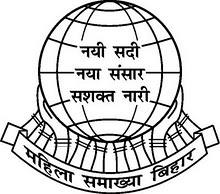 Mahila Samakhya Society, Bihar
Mahila Samakhya Society, Bihar
Govt. of Bihar
East Gandhi Maidan, Patna 800004
PATNA: "If you're HIV positive, roadside chaat is definitely not for
you," says Usha Devi, firmly. "If anyone in my family is HIV positive,
we'll make sure that she drinks boiled water and plenty of it. Even if
she looks healthy, she must be protected from any chance of infection,"
she added.
Usha Devi isn't a doctor, just a neo-literate woman
from a village in Purnia. But thanks to a collaborative effort of some
NGOs in Bihar, she's equipped with enough basic knowledge and confidence
to help HIV positive people and their families battle discrimination.
"Don't hit us with information on how AIDS is acquired. We know that.
Tell us what to do when someone has AIDS, how to handle it and how to
help," echoed 25-year-old Suman Kumari from Supaul. "We want to know
where to get tested, where to get medicines, how to treat these patients
at home where there is no hospital," she said.
HIV and AIDS is
no longer a remote exotic disease for Bihar's villages and towns. Every
day government and private labs handle hundreds of HIV tests and, as a
technician from the Kurji Holy Family Hospital (KHFH) put it, "Every
week, there's bound to be one or two HIV positive result in the blood
samples tested. It's not something rare, like a decade ago. There's more
testing, there's more awareness."
Shantwana Bharti, who looks
after women's legal affairs at Mahila Samakhya, said, "Every block in
Bihar has 20-30 persons who are locally known to be infected. So, it is
all the more important how to tell the people to manage HIV and AIDS,
because it is ignorance that breeds fear. And this fear leads to
violence or the expulsion of the affected person."
Nineteen-year-old Shruti Sinha insisted that she as well as her would-be
husband should be tested for HIV. "My parents were shocked. They felt
really embarrassed to bring such a subject to the guy's family," she
said. On her insistence, the boy agreed that it was the sensible thing
to do. Imagine her distress when the results showed that it was Shruti,
and not the boy, who was HIV positive. Two years before, Shruti had
undergone a blood transfusion at a private clinic. Her AB negative group
was rare. So the blood was 'arranged'. The clinic claimed that the
blood was 'tested'. "The test shattered my dreams. I wanted to sue the
clinic. Here, the legal process is complicated. I was shattered and
angry," she said.
Her parents were traumatized. "What we need is
information on how to live with HIV, not just how to prevent it," she
says. Her father spent lots of money on 'Ayurvedic treatment' for HIV.
It was only after a prolonged discussion with AIDS counsellors that he
realized that such 'medicines' were no substitute for the antiretroviral therapy (ART).
Shruti is gainfully employed at a call centre in Patna, but she still
remains 'in the closet'. "The poor cannot afford to buy ART from private
sources. They need a dependable supply, and the supply is often
erratic. ART is a complicated regimen and the medicines have to be
administered strictly according to time. It is better the family learn
how to prolong the 'good health' window of an infected person by simple
and balanced diet and avoiding any chance for infection," says Sister
Francina, who runs a community care centre for AIDS patients on the KHFH
campus.
Bihar is changing, but where's the change in attitude? That's what Shalini, a IInd-year student of JD Women's College
asks. The AIDS education programmes are of 1990s vintage. The ground
reality has changed, point out experts. For example, the myth about HIV
infection from a used razor has long been smashed, because the virus is
too fragile to survive outside its medium for more than a few seconds.
But people are still told that you can get HIV through 'infected
blades'.
Bihar State Aids Control Society needs to tune up. "We
need proper access to the ART and more community care centres, not just
the so-called Behaviour Change and Information Education Communication.
Government must ensure safe blood products, and close illegal blood
banks. We need doctors who are supportive, sensitive, and knowledgeable.
Many government doctors aren't updated on the latest information. This
can be seen from the way they shun HIV positive patients. We need to
talk about care, support and life rather than repeat the same tired
slogan, 'AIDS kills'. Young people don't pay attention to the same old
messages," says Sanjeet Singh, an active member of the Bihar Network of
Positive People.
Says Anshuman, a psychology (hons) student of
AN College, "Times are changing. India now belongs to people under-30.
That's the reality of life. Lifestyle has changed. Condoms and HIV
management are parts of life. No use trying to turn the clock back by
banning this and stopping that. It's time to deal with it."
(Some names of women have been changed to protect their identity)
source :TOI
No comments:
Post a Comment